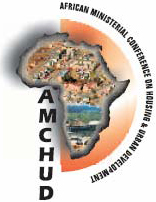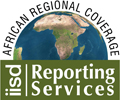|

In 2003
the second session of the African Union Assembly adopted
Decision 29 on urbanization and chaotic urban growth in
Africa, in which Heads of State and Government called for a
coordinated African response to the challenges of
urbanization.
The
African Ministers Conference on Housing and Urban
Development (AMCHUD) was established in 2005, as the main
consultative mechanism on the promotion of sustainable
development of human settlements in Africa. AMCHUD is the
primary intergovernmental vehicle for governments to improve
African cities, enabling them to realize their full
potential as centers of hope and prosperity for their
peoples, rather than as concentrations of deprivation and
squalor. AMCHUD provides a continent-wide platform to share
ideas, exchange best practice, and discuss effective
strategies to achieve sustainable urbanization in Africa.
MANDATE: AMCHUD’s
vision is to serve as a consultative mechanism on the
promotion of the sustainable development of human
settlements in Africa. Its mission is to develop,
facilitate and co-ordinate a common African Position on
issues of sustainable urban development and human
settlements in Africa.
The
Inaugural Conference of AMCHUD held in February 2005, in
Durban, South Africa adopted the Durban Declaration to
institutionalize AMCHUD under auspices of the African Union.
The meeting also adopted the Enhanced Framework of
Implementation, which provides the basis for a concerted and
a coordinated programme of action focusing on: slums,
shelter delivery, and the provision of and access to basic
services for all; urbanization and human settlements within
the Framework of the African Union’s Strategic Plan and the
NEPAD Programme; governance and urban development; and
financing for housing and urban development. Under the
Enhanced Framework, AMCHUD will, inter alia:
 Serve as a forum to discuss the urban challenge at the
continental level and regional level as a basis for national
and city level strategies and as a focus for the discussion
of the Habitat Agenda and the relevant Millennium
Development Goals and Targets;
Serve as a forum to discuss the urban challenge at the
continental level and regional level as a basis for national
and city level strategies and as a focus for the discussion
of the Habitat Agenda and the relevant Millennium
Development Goals and Targets;
 Encourage and promote the strengthening of urban governance
in Africa;
Encourage and promote the strengthening of urban governance
in Africa;
 Champion and support innovative urban development and land
management practices in Africa;
Champion and support innovative urban development and land
management practices in Africa;
 Promote development of appropriate housing and low-cost
construction technology for rural and urban housing;
Promote development of appropriate housing and low-cost
construction technology for rural and urban housing;
 Facilitate South-South and international exchanges of
expertise, research, experience and best practices,
including on the eradication of slums;
Facilitate South-South and international exchanges of
expertise, research, experience and best practices,
including on the eradication of slums;
 Develop a better understanding of urban land dynamics that
can lead to improved land tenure and to the growth of urban
land markets in Africa;
Develop a better understanding of urban land dynamics that
can lead to improved land tenure and to the growth of urban
land markets in Africa;
 Support and strengthen the NEPAD Cities Initiative;
Support and strengthen the NEPAD Cities Initiative;
 Support relief and rehabilitation of shelter and human
settlements development in post-conflict and post-disaster
situations;
Support relief and rehabilitation of shelter and human
settlements development in post-conflict and post-disaster
situations;
 Engage with development partners and multi-laterals on urban
development issues in Africa and their financing;
Engage with development partners and multi-laterals on urban
development issues in Africa and their financing;
 Promote strong ties between research institutions to
understand better the economic, legal and financial
importance of urban development and urban land in Africa;
Promote strong ties between research institutions to
understand better the economic, legal and financial
importance of urban development and urban land in Africa;
 Encourage the collection of data and information that can
improve the planning and management of urban development;
Encourage the collection of data and information that can
improve the planning and management of urban development;
 Promote the institutionalization of a culture for urban
planning including the preparation of urban strategic plans
at both national and local authority level; and
Promote the institutionalization of a culture for urban
planning including the preparation of urban strategic plans
at both national and local authority level; and
 Encourage the mobilization of domestic financial resources
for housing and urban development.
Encourage the mobilization of domestic financial resources
for housing and urban development.
STRUCTURE: AMCHUD comprises a Biennial Ministerial
Conference, a Bureau, and Secretariat. The Biennial
Ministerial Conference, comprising Ministers responsible for
Housing and Urban Development, will normally meet after
every two years to consult and review progress on the
promotion of sustainable development of Human settlements in
Africa. AMCHUD meets every two years, normally three months
before the sessions of UN-HABITAT Governing Council of
UN-HABITAT. South Africa is the current Chair of AMCHUD. The
AMCHUD Bureau (2005-2007) comprises of West Africa:
represented by Senegal; North Africa: represented by
Algeria; Central Africa: represented by Chad; and Eastern
Africa: represented by Kenya, and also Rapporteur of the
Bureau. The Durban Declaration requested the African Union
to mainstream issues of housing and urban development in the
structure of the African Union by establishing a Specialized
Technical Committee for the sector, including rendering
related political and other forms of support to AMCHUD and
giving a high prominence to the challenges of urban
development in the NEPAD programme. |




